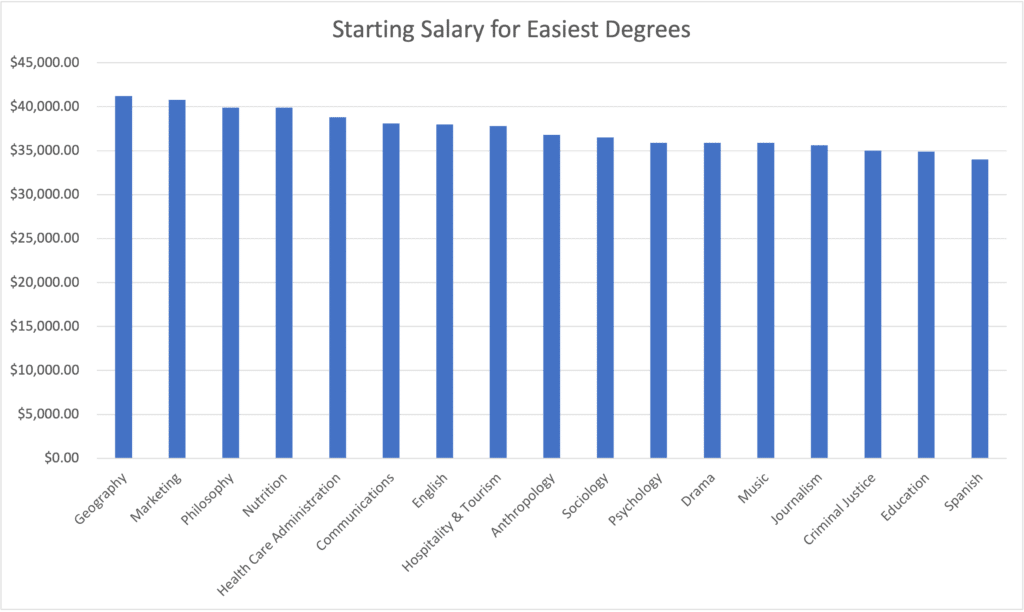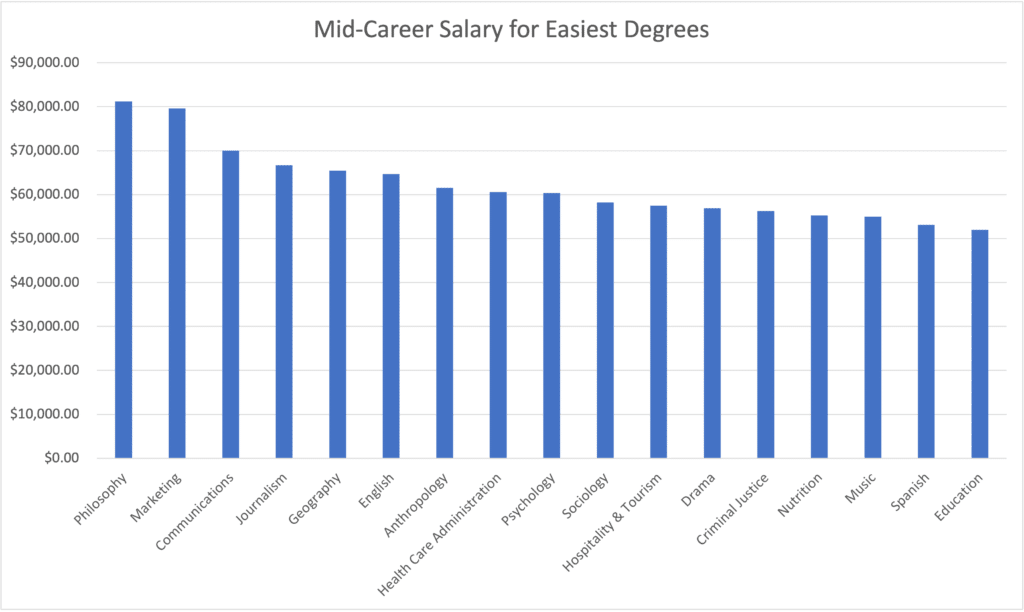For many a college student, the idea of pursuing well-paying yet rigorous STEM degrees like engineering or math is dreadful. Naturally, many ask: what are the easiest college majors that pay well? Or what are the best paying non-STEM or not engineering majors? After all science and engineering aren’t for everyone.
Since I have collected extensive data on difficulty by college major, I’m happy to shed some light on this question.
So, what are the easiest majors that pay well? Philosophy is the best choice, followed by Marketing, Communications, Geography, English, and Health Care Administration.
Just for kicks, here’s the list for the worst paying easy majors, those you should be sure you want to study before proceeding: Education, Spanish, Music, Criminal Justice, Drama, Psychology, and Nutrition.
Somewhere in the middle are Journalism, Psychology, and Hospitality & Tourism.
Philosophy is the best choice, followed by Marketing, Communications, Geography, English, and Health Care Administration.
Measuring Pay
Using data collected by Payscale Inc (as featured on visualcapitalist), of over 1.2 million college grads that only have a Bachelor’s degree, I rate each major’s pay-off by looking at its median starting salary, and its median mid-career salary.
How Do We Know These Majors Are Easy?
In a previous blog post I discuss the ratings I collected on major difficulty from over 1 million student reviews of college coursework. The difficulty ratings correspond well with each major’s average study hours per week.
I consider easy majors to be those that are below average in difficulty.
I consider easy majors to be those that are below average in difficulty. The table of difficulty for this list of majors is below. The “Difficulty Percentile” is the major’s difficulty rank compared to all other majors.
A 40th percentile score for a major, means the major is more difficult than 40% of college majors, which also means 60% of the majors are more difficult than it.
| Undergraduate Major | Difficulty Percentile |
| Journalism | 50% |
| Nutrition | 50% |
| Marketing | 47% |
| Philosophy | 46% |
| English | 41% |
| Anthropology | 38% |
| Geography | 37% |
| Psychology | 33% |
| Communications | 32% |
| Spanish | 27% |
| Sociology | 20% |
| Criminal Justice | 19% |
| Music | 17% |
| Education | 16% |
| Hospitality & Tourism | 12% |
| Drama | 11% |
| Health Care Administration | 6% |
How Do Easy Majors Differ From Hard Majors?
College majors vary dramatically in terms of what they expect from their students academically. Some programs pile on homework and projects that require hours of work outside of class to complete. Moreover, some majors purposefully design the homework and exams to be as challenging as possible, to develop students with the skills that professors consider to be essential for their profession.
[do_widget “Block”]
Easy majors tend to expect less studying and work from their students. Much of the work will require little effort, and even “mandatory” homework such as readings will in reality be optional, or can be quickly completed using methods such as skimming.
Some majors are too popular, and so are forced to raise the standards academically so only the best can stay on. Other programs struggle to attract enough students as it is. Making coursework easy may be one way of retaining as many students as possible and attracting new ones.
Starting Salary for the Easy Majors

In terms of starting salary Geography, Marketing, Nutrition, Philosophy, and Health Care Administration round out the top five.
Mid-Career Salary for the Easy Majors
By the time mid-career rolls around, the top five are: Philosophy, Marketing, Communications, Journalism, and Geography. Nutrition in particular moves down in rank from 4th to 14th, while Journalism goes from 14th to 4th place.

Overall List of Best Paying Easy Majors
Combining the information on salary both at the start and middle of career, these are best paying easy majors (in order):
- Philosophy
- Marketing
- Communications
- Geography
- English
- Health Care Administration
A Note of Caution
One thing to point out is that this analysis only considers annual salary but leaves out many other important factors such as occupation and non-pay benefits.
If someone majors in Marketing, it’s likely they are working in a related business type field, perhaps selling ads. But if someone majors in Philosophy or English, it really isn’t clear what they are doing for their occupation. More likely than not, they are probably working in completely unrelated fields to what they studied.
I recommend considering more than easiness when choosing a major. College is only 4 years, but a working career lasts 40.
This is something to consider before choosing a major. The Bureau of Labor Statistics is a great resource for getting information on what occupations people with a specific degree work in. Here, is an example for a degree in Philosphy.
I hope this information is helpful for those students that would like to avoid STEM majors. But I would recommend considering more than easiness when choosing a major. College is only 4 years, but a working career lasts 40.



